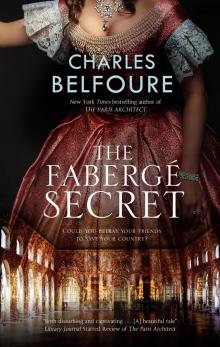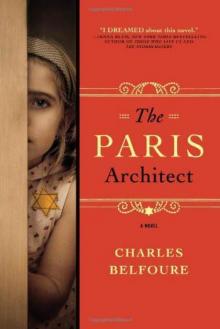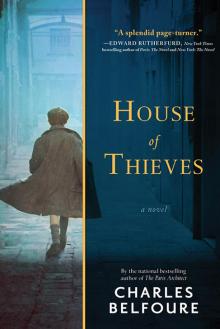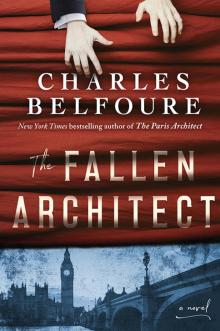- Home
- Charles Belfoure
The Fabergé Secret Page 11
The Fabergé Secret Read online
Page 11
They said their polite goodbyes. As Katya’s elderly servant was opening the door for her, and she turned to go inside, Dimitri touched her shoulder lightly.
‘Please forgive me for asking, but you seemed to be troubled by something lately. Is everything all right?’
Katya looked up into his concerned eyes and gave him a shy smile.
‘You’re a very intuitive and thoughtful man,’ she replied slowly. She looked genuinely touched. ‘No, it’s just a small family matter, nothing bad.’
‘Oh, good. Then are you available for tea tomorrow afternoon?’
‘Yes, my shift is over at three. I’d love to have tea.’
‘At three then,’ Dimitri said with a bow. ‘My carriage will be waiting.’
Before Katya turned to go inside, she stopped and faced him.
‘I came across the oddest story,’ she said with a perplexed expression. ‘It was about these Jewish boys conscripted into the army who were coerced into converting to Christianity. To please Tsar Alexander I, who was to inspect the camp, the commanding officer arranged for a group of twenty Jewish recruits to be baptized by a priest in the river. But when they were submerged, they had made a pact to not come up. They drowned themselves – still holding hands. You have to have a very strong faith to make that kind of sacrifice.’
Dimitri was puzzled by this. It came out of nowhere, and he didn’t know how to respond.
‘Yes … the Hebrews are a strange race,’ he said.
Katya’s expression froze, and she darted into the house.
SIXTEEN
Miss O’Brian checked the time by looking at the little watch pinned to her blouse. Her four charges would be starting their dancing lessons now. They all danced very gracefully; even two-year-old Anastasia was getting the hang of it. With all the balls they would have to attend, the earlier they learned to dance, the better. In addition to their regular school lessons, the Tsarina also sat in and observed their dancing lessons while doing embroidery work. Coming from a small German court where royalty occupied themselves usefully, she hated the idleness of the Imperial Court. She wanted to stay busy, even when she was with the children. Miss O’Brian could remember her holding her infant babies while reading and signing papers of state. A woman of exceptional intelligence, the Tsarina wanted her daughters to have well-developed minds and intellectual interests, unlike the ladies of the Court – especially that silly Lara Markhov. All the young women in Court, the Tsarina said, seem to have nothing in their heads but officers and parties. She dreaded for her daughters the companionship of the women of the aristocracy, who would fill their heads with vicious gossip and wicked values.
Miss O’Brian checked her watch again and decided she had time to make a detour across the Moika Canal to the Nevsky Prospect, to buy the raspberry-filled chocolates the girls loved so much. It wasn’t as though they were continually spoiled. On the contrary, she was shocked to find that the Grand Duchesses slept on hard camp beds without a pillow and covered by one plain blanket. They had cold baths every morning, and warm ones at night. Only porridge and bread were served at breakfast. This was all due to the fact that their father, Nicholas, had been raised the same Spartan way by his father Alexander III, a bear of a man who prided himself on living a simple rigorous life reminiscent of a peasant’s. But the reason she was making the trip for the candy was because she truly loved her girls. As with many nannies, if not biologically, these were her own children. Eight-year-old Olga had grace, wit, and good looks, but she also had a temper; six-year-old Tatiana looked like her mother and also inherited her kind disposition. Four-year-old Marie, the most beautiful, had wonderful wide eyes and red-rose cheeks. Anastasia was turning into a clever child with a penchant for mischief. They all had a tomboy inclination, which pleased Nicholas, who loved to roughhouse with them. The Tsar was an exceptionally loving father who spent every spare minute he had with them and his wife. He was nothing like Miss O’Brian’s father, a stern, gruff factory worker in London, a Marxist agitator who lived for the overthrow of the capitalists the world over. The man breathed revolution like a dragon breathes fire. From the time she was a toddler, Constance O’Brian had been indoctrinated in the revolutionary movement. It became her religion and passion. And now she had the opportunity to help topple an autocracy.
‘You’re doing the revolution a great service, Comrade.’
Every two weeks at an appointed time, Miss O’Brian met her revolutionary contact, Ivan Azref, on the second floor of a rundown building off an alley behind Krasnova Avenue.
Miss O’Brian handed her Kodak Brownie camera to the dashing fellow, who had a hawk-like nose and high cheekbones. Azref had been a captain in the Tsar’s Household Guard for eight years. Now, he dedicated his life to the overthrow of the Tsar. Azref was quite pleased to hold the little black box camera.
‘Why do you need maps of Port Arthur?’ she asked.
Azref put the camera on the desk and motioned for Miss O’Brian to take a seat. He sat on the desk and pulled out a cigarette.
‘Russia wants to take Korea away from Japan. Japan doesn’t want to give it up and will go to war with Russia to stop them. They’ll attack Port Arthur first to destroy the fleet,’ Azref said in the slow measured tone a schoolmaster would use.
‘Go to war with the Russian Empire? That’s ridiculous, they’ll be crushed,’ Miss O’Brian said with disdain.
‘That’s what most Russians would say. That the Empire would never be defeated by a bunch of “yellow monkeys,” as they call the Japanese.’
‘But isn’t it true?’
‘No, because the Japanese have been modernizing their military in the last ten years and now have a far superior army and navy.’
‘So, a Russian defeat would help the revolution,’ Miss O’Brian said in an astonished voice.
‘Exactly. We have to make that defeat happen to bring about the civil dissent to fuel the revolution. All the men who’ll die needlessly in the war will be peasants who will be quite angry with the Tsar and the government. Your help, Comrade, is absolutely critical to our mission.’
‘Yes,’ the nanny replied excitedly.
‘We need every scrap of information about Russia’s plans in the Far East. The Tsar meets with his military advisors and ministers in his study in the Alexander Palace, and you have access to that study. You must commit to memory any information you can find.’
‘A fifty-year-old nanny is as invisible as the servants. No adult pays her any attention or even realizes she’s in the room,’ replied Miss O’Brian with a wan smile.
‘Another reason Russia will lose is that it has to transport every man and piece of equipment over four thousand miles on a single track of the Trans-Siberian Railway. Japan is only two hundred miles from Korea.’
‘I’ll be proud to be an agent if it helps bring about revolution,’ she said earnestly. Then, suddenly, she scowled at Azref. ‘But I’ll have nothing to do with violence, do you understand? Marx rejected violence! I won’t do anything that will harm the Imperial Family!’
Azref got up and placed his hand on her shoulder.
‘No, Comrade. We don’t believe in violence either. There is a rogue faction called the Combat Group that does believe in terrorism, but we have nothing to do with them.’
The angry look on Miss O’Brian’s face disappeared.
‘You are our most important agent provocateur in the Imperial household.’
A puzzled look came over her face.
‘You have other agents in the household – in the palaces?’
‘Yes,’ Azref said in a matter-of-fact voice. ‘But for your own protection, you can’t know who they are. The Okhrana would torture you to get their names.’
As Miss O’Brian’s mind was forming images of such a thing, Azref handed her a tiny folded note.
‘You will always deliver your war information directly to me. But you’ll also be our new postman delivering messages to our inside agents via the Fabergé “mailbox
es.” Put this note inside any Imperial Egg in the display room in the Alexander Palace, then move the egg slightly forward of the others. And when you see an egg that’s been moved, you’ll bring its message back to me so I can decode it.’ He showed her a small leather-bound notebook that was filled with columns of letters of the alphabet next to columns of different letters. She immediately understood the system, an A for example was transposed into a C.
Miss O’Brian’s somber expression changed into a big smile.
‘The freedom of movement that comes with your position makes it far easier and safer to make a delivery than with the other agents we’ve been using,’ Azref explained.
The nanny tucked the note carefully in her jacket pocket. As she was leaving, Azref noticed there was a pronounced bounce in her step.
SEVENTEEN
Dimitri was standing on the deck of the Standart, the sleek black-hulled Imperial Yacht, where Nicholas and Alexandra could escape from the Court and the demands of government. At four million rubles, it was the most luxurious private yacht in the world. Steaming on the calm blue waters of the Gulf of Finland, a constant cool breeze swept over the ship as the bright summer sun shone on its gleaming teak decks. Under white canvas awnings were wicker tables and chairs where Alexandra would sit, knitting, reading, or just looking out to sea, especially at sunset. The Tsar would join her for a while, but he preferred to move about the ship in his white naval uniform talking to the captain and crew. He would sometimes row ashore and take walks by himself in the Finnish forests or take the children to pick berries and wildflowers. The girls loved the yacht because it meant uninterrupted time with their father.
Unlike the palaces, life on the Standart was extremely informal. The family mingled freely with the crew, and they were on a first-name basis with the sailors and officers. The girls could go about the deck as they pleased, but Anastasia had a sailor assigned to her to make sure she didn’t fall overboard. The other three children had learned to swim. At the end of the cruise, he would be awarded a gold watch for his service by the Tsar. The ship was a thirty-room floating palace with imperial cabins and staterooms. Below were the galleys, the officers, the crew, a platoon of Marine Guards, and a brass band and balalaika orchestra. There was even a stall for a cow to provide fresh milk for the girls. For all its incredible opulence, the Standart was constantly plagued with rats, which the family had become used to as though they were members of the crew. If a rat entered a guest’s cabin, they were instructed to throw a shoe at it.
Nicholas hated working onboard the yacht, but he had to keep up with government matters. Although he banned his ministers and police security from the Standart, courier boats powered by the new gasoline outboard motors carried official documents from St Petersburg daily to the ship. Whenever the tsar was on a cruise, an escort destroyer was off on the horizon and two small navy torpedo boats were a few hundred yards away. Today was the same relaxing routine – swimming, fishing, exploring the beach, then supper at nine. After tonight’s meal, the family was entertained by the ship’s balalaika orchestra playing Russian folk songs in the state dining saloon. Dimitri sat by Alexandra.
‘Look, Dimitri, at my little happy family,’ she said.
He reached into the pocket of his white tunic. ‘I left my cigarette case up on deck,’ he said in an irritated voice. It was the Fabergé case the Tsar had given to him for Easter, and he panicked when he thought he might have lost it.
‘Excuse me for a moment, Your Majesty.’
‘Leave it, Dimitri. You smoke too much,’ scolded Olga. Dimitri winked at the Grand Duchess and went up on deck. He found the case on a wicker table. Taking out a cigarette, he looked up into the evening sky. At these northern latitudes in the summer, its color was a milky haze of pearl, so he could still see out to sea very clearly. The Standart was at anchor, and the only sound in the night was the lapping of the sea against the hull. Dimitri heard a low motor from the direction of the coast. As he tossed the cigarette into the sea, he realized the noise was getting louder. In the evening light, he could make out an Imperial courier boat coming toward the yacht. He went back to the saloon and passed an officer, Captain Oneff.
‘There’s a courier boat coming alongside,’ Dimitri said.
‘At this late hour, it must be an urgent dispatch,’ Oneff said. Both men went up on deck.
Oneff had brought a pair of binoculars and scanned the direction.
‘It’s odd there’s no helmsman at the rudder,’ he said.
‘Call out the Marine Guard!’ Dimitri yelled suddenly. Oneff blew the whistle around his neck repeatedly until a dozen soldiers in white and red tunics came running on deck.
‘Rapid fire at that boat – and don’t let up!’ Oneff screamed.
The night air was filled with non-stop rifle fire. The boat was about fifty yards away now. The naval officers joined them and fired their revolvers.
Now only thirty yards from the hull of the Standart, the courier boat, riddled with bullets, exploded in a ball of fire lighting up the sky like the sun. Pieces of wood hurled into the air, and burning wood floated on the water. Then there was complete silence. Dimitri heard footsteps, the Tsar ran up on deck with a look of shock.
‘Goddamn it,’ yelled Blokh. In a fury, he hurled his cap to the ground and started pacing around it. He leaned against a birch tree and with a stunned expression, looked out from the edge of the forest at the burning debris in the Gulf of Finland.
‘Come on, we have to get the hell out of here,’ said Hersch, tugging on his friend’s sleeve.
EIGHTEEN
‘We’ll have a wide red granite arch as the entryway. Within it, the words “Tchaikovsky Memorial” will be carved and the date of construction.’
‘That will be impressive, Dimitri. We should have two great staircases, one for the conservatory students, and the other for concertgoers to get to the balconies. I’ve decided that nothing but Tchaikovsky’s works will be played here,’ the Tsar said excitedly.
The Imperial Family had just returned from a religious ceremony in Sarov, and Dimitri had been invited to supper. Afterward, he joined the family in Alexandra’s boudoir. The Tsarina was stretched out on her mauve chaise longue doing embroidery. Marie and Anastasia were spread out on the carpet playing with toys, and the two oldest were reading. As he did every week, Dimitri went over the latest sketches of the Tchaikovsky Memorial with Nicholas, laying out the basic spaces. The plan of the building would be just about final when Nicholas, like all clients, decided to add or change something.
‘There should be a niche in the center of the lobby for the portrait of Tchaikovsky.’
‘We have it centered in the outer foyer now.’
‘The lobby would be better. More room to look at it,’ Nicky replied.
‘You should put in an ice-cream parlor, Dimitri,’ said Marie. Her sisters chimed in in agreement, which made Nicky laugh.
‘I hope you enjoyed yourself at Sarov, Alix,’ Dimitri said, not looking up from the sketch he was doing.
‘I prayed to St Seraphim for divine intercession to grant us a son, Dimitri.’
Dimitri met Alexandra’s gaze. He knew how she felt. After two years of trying to have a child, Dimitri, while not a religious man, had even tried praying to God to grant his most fervent wish. He craved to be a father, but nothing had happened. He actually began to believe God was punishing him for something he’d done by making them unable to conceive.
When Anastasia was born in 1901, Dimitri knew that beneath the joy was great disappointment on the Tsarina’s part. Being brought up by Queen Victoria, Alexandra was familiar with women being heads of state. But Russia was different. Tsar Paul I, who had so hated his mother Catherine the Great, had decreed that no woman would ever sit on the throne. When Nicky almost died in 1900 of cholera, the heir was his brother, Michael – not Olga, their oldest child. The dream of providing a son and heir for Russia had become an obsession for Alexandra.
‘You and Nicky were qui
te moved by the ceremony in Sarov, weren’t you?’ Dimitri said gently.
The Imperial Couple along with clergy, bishops, and Grand Dukes had participated in the canonization of St Seraphim of Sarov, a holy man linked with miraculous healings. Because ancestors of the Tsars were said to have been healed by him, Nicholas had initiated the proceedings, which delighted the Tsarina.
‘It was an incredibly touching experience, I’ll never forget it,’ Nicky replied.
‘At night, I bathed in the holy pond while Nicky sat on the bank. St Seraphim is my intercessor before God, and I entrust my will to Him. He will provide us a son.’
Dimitri smiled and nodded. Lara constantly ridiculed the Tsarina’s faith, and Dimitri, who genuinely liked the Empress, had to agree that she took it to a ridiculous level. But nonetheless, he admired her unwavering piety. It was her nature; if she believed in something, she believed with all her heart without reservation.
‘Our Tsarina will have her son.’ Anna Vyrubova was sitting in an armchair doing needlework. This young woman had become the Tsarina’s closest confidante, visiting with her daily. Anna worshipped the Tsarina. She lived in her own cottage at Tsarskoe Selo. She wasn’t a member of Court because Alexandra didn’t want a friend in the Court that she hated so much. To Dimitri, she seemed like a bootlicker. The Court, which was quite envious of Anna’s access, spread ridiculous lies about her, like she was sleeping with all the black Abyssinian Guards, or appeared in the nude in her window which was across from a sentry box. This was total nonsense, though one of the children’s nurses was caught in bed with a Cossack a couple months ago. Alexandra had sacked her on the spot.
‘The crowd was wonderful, Dimitri. Fifteen thousand people were at the monastery, all cheering me. I moved amongst them, and they reached out to touch me,’ Nicky explained with great emotion. ‘The police did not hold them back. The people blanketed me with their affection.’

 The Fabergé Secret
The Fabergé Secret The Paris Architect: A Novel
The Paris Architect: A Novel House of Thieves
House of Thieves The Fallen Architect
The Fallen Architect